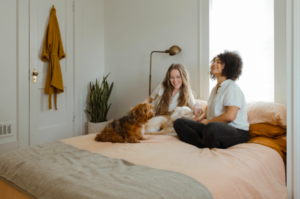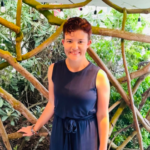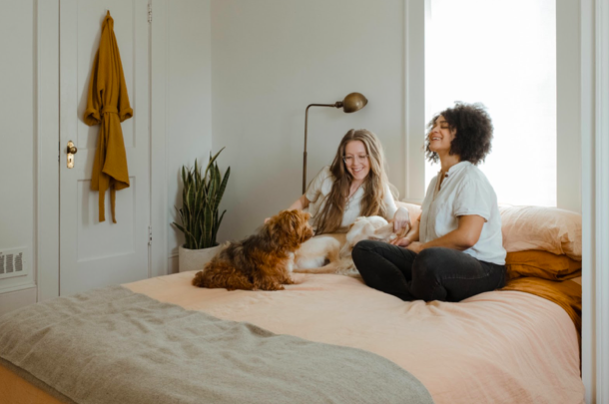 For many members of the gay liberation movement, Pride is a time to remember our historic roots from Stonewall to marriage equality, celebrate queer joy, and come together to be proud of who we are. But every June, like clockwork, lesbians are routinely invalidated, erased, oversexualized, and underrepresented, both on social media and in real life.
For many members of the gay liberation movement, Pride is a time to remember our historic roots from Stonewall to marriage equality, celebrate queer joy, and come together to be proud of who we are. But every June, like clockwork, lesbians are routinely invalidated, erased, oversexualized, and underrepresented, both on social media and in real life.
While in the closet, I imagined the LGBTQ+ community to be some rainbow utopia where Lady Gaga’s full discography played uninterrupted at all times. The coffee shops would be independent, use oat milk, and everyone would follow a strict itinerary that consists of various intervals for brunch, where we’d meet to fervidly discuss the latest episodes of Queer Eye, RuPaul’s Drag Race, and Orange Is the New Black. A drag monarchy would rule over citizens with politics based in radical self-expression. These queens would abolish gender norms, promote inclusivity, and hereby exile any obsolete cisgender, heteronormative ideals in favor of new revolutionary cultural customs — Pride Month being the most respected holiday.
So when I came out as a lesbian in August 2020 in Charlotte, North Carolina, I didn’t expect social isolation to continue past the steady decline of the pandemic, nor realize just how subtle homophobia can feel if your identity is stigmatized enough that people treat The L Word like a plague they’re afraid to catch, and society isn’t afraid to catch plagues anymore. In fact, we walk right up to global pandemics and shout “Come and take me, ya weeny! I dare you!” in their faces. That’s the good old American way. Needless to say, it pretty much sucks.
Desperate to find a community, I downloaded my first dating app, only to discover two shocking truths. First, if I want to meet a lesbian within close proximity (not a another random straight couple looking for a third), I must first move out of the suburbs, adopt a cat, and live in a van while we listen solely to Fleetwood Mac. Second, lesbians, including me, don’t want to use the word “lesbian.” Especially since the first time I felt brave enough to use it out loud, boys laughed and snickered in response. It’s much easier to use the term “gay.”
Recently, I saw a girl whose profile said: “Queer. I’m actually a lesbian, but it’s a gross word,” which is why I’m going to use the word “lesbian” in this essay until you physically can’t think of another synonym to replace it.
Even the singer girl in red, whose name translates to “Are you a lesbian?”, reportedly said, “Lesbian is my least favorite word.” Why do we feel the need to associate women in love with the eroticization of their sex? To reduce the beauty of female intimacy and the inherent bravery required to be vulnerable in a strong, caring, emotional partnership to what happens in the bedroom? Lesbian isn’t a dirty word. It’s not a kiss from your grandmother you need to actively avoid or face the consequences. We are literally the first letter in the acronym. Ignoring it would be like if people never said the word bacon to order a BLT. Yes, can I please get lettuce, tomatoes, uhhh, pig? Different meaning, right? Then what makes society too intimidated to say it? Well, let’s start with how lesbians are represented in the media.
Look at Instagram. If you search other sexualities like “pansexuality” and “bisexuality,” the results are all related to positivity, relatively innocent memes, and supportive, albeit cringey text posts. If you want to meet other lesbians, though, the app will suggest you befriend vaguely disguised p*rn bots, made apparent due to such delightful username declarations as “HOT FREAKY LESBIAN S*X!” and “WATCH GIRLS KISS FOR FREE! WE DON’T OBJECTIFY THEIR BODIES AT ALL!” To make matters worse, these are often run by the same creepy, pedophilic middle-aged men on the internet that your parents warned you about, and they probably go to church every Sunday to listen to a pastor preach homophobic garbage.
No wonder young girls might feel scared to question their own attraction to women.
Similarly, supposed safe spaces on apps like Twitter and Tumblr are rampant with constant lesbophobia — surprisingly alongside their encouragement of other marginalized sexualities and gender identities. Additionally, the “hey mamas” joke on Tik Tok quickly became a subtle, acceptable way to make fun of butch masculinity, and specific terms like “dyke” are hijacked despite the history attatched to the lesbian-centric slur. If we call others out, we are deemed too sensitive or too angry, and are told to take the joke. This perpetuates the angry, man-hating, irrational, radical feminist caricature who never shaves, swears, and wears big, stompy boots.
The last issue lies in television. Although Hollywood has certainly progressed in terms of LGBTQ+ representation, queer women and lesbians experience a stark lack of visibility compared to gay men. Part of the reason it took me until I turned 19 to come out was because my only real comparisons were Ellen and Glee’s fictional Santana and Brittany, who often portrayed common stereotypes like bisexual promiscuity and false manipulative tendencies rather than an honest, accurate representation of an openly sapphic relationship, or relationship between women, in high school. Had numerous actresses and characters been visible, I might have related to them at an earlier age, thus given the positive tools necessary to understand, explore, and express my true identity. We need to see more than the labels society places upon us. More queer happiness, less tragedies. We deserve unconditional, universal acceptance.
In conclusion, I suppose I don’t feel qualified to celebrate the anniversary of the Stonewall Riots (I didn’t even know the name of Marsha P. Johnson until sophomore year of college) since I’m still figuring out what it means to feel at home in my skin. I don’t particularly enjoy Lady Gaga. I go to Starbucks, use regular milk, and no one invites me to brunch. Even if they did, I have never seen a single episode of Queer Eye, RuPaul’s Drag Race, or Orange Is the New Black, which is probably why no one invites me to brunch. Occasionally, I must come out to strangers.
The most recent incident happened on a trail ride in Blowing Rock, North Carolina, after a cowboy asked if I had a man in my life yet on my twentieth birthday. We stared at each other.
A silence deepened between us. I half expected an old-timey Western movie whistle to echo throughout the pouring rain atop the mountain; however, he merely paused, spit out a cancerous piece of chewing tobacco, and made eye contact that would have been uncomfortable had he not said what he said, which was “Ain’t nothing wrong with that. Never be ashamed of who you are…So, got a woman in yer life yet?” Sure, it may not be the fantasy universe I wanted.
But sometimes our world gives us unexpected glimpses of a better one.
 Lara Boyle is a Jewish, Autistic, lesbian essayist. She studies Creative Writing at Queens University of Charlotte. Her work has been previously published by Herstry blog and Signet Literary Magazine.
Lara Boyle is a Jewish, Autistic, lesbian essayist. She studies Creative Writing at Queens University of Charlotte. Her work has been previously published by Herstry blog and Signet Literary Magazine.

There are no comments
Add yours